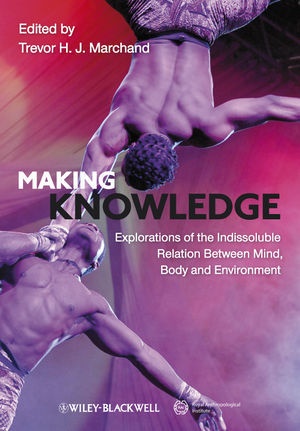Mehr lesen
Informationen zum Autor Trevor H. J. Marchand is Professor of Anthropology at SOAS, University of London. As a trained architect and qualified furniture maker, he has conducted fieldwork with craftspeople in Arabia, West Africa and the United Kingdom. His research focuses on apprenticeship, cognition and communication. Marchand is the author of Minaret Building & Apprenticeship in Yemen (2001) and The Masons of Djenné (2009), and co-producer of the documentary film Future of Mud (2007). Klappentext As a species, we are composed, in part, of innate capacities - biological, perceptual, cognitive and motor - that engage us with the world of which we are a part, and thereby enable us to survive, adapt and thrive. By contrast, arts and virtues are not innate, but realised and reinforced in social and cultural practice. The contributions to this volume progress our thinking about human knowledge through explorations of the interdependence of nurture with nature: and more specifically the interdependence of mind, body and environment. While emphases on the roles played by environment and context in the processes of knowledge-making vary between the authors, all situate the sentient, practicing body at the core of their work. Investigations are guided by the eternal questions of 'How we know?' and 'How we come to know?' The acute observations and ground-breaking theory that arise from the ethnography promote deeper, better-informed questioning about knowledge, and stimulate interdisciplinary approaches to the study of human learning, thinking and practice. Zusammenfassung Making Knowledge presents the work of leading anthropologists who promote pioneering approaches to understanding the nature and social constitution of human knowledge. The book offers a progressive interdisciplinary approach to the subject and covers a rich and diverse ethnography. Inhaltsverzeichnis Notes on contributors. Preface. Trevor H.J. Marchand: Introduction: Making knowledge: explorations of the indissoluble relation between mind, body, and environment. 1 Greg Downey: 'Practice without theory': a neuroanthropological perspective on embodied learning. 2 Tom Rice: Learning to listen: auscultation and the transmission of auditory knowledge. 3 Anna Odland Portisch: The craft of skilful learning: Kazakh women's everyday craft practices in western Mongolia. 4 Nicolette Makovicky: 'Something to talk about': notation and knowledge-making among Central Slovak lace-makers. 5 Trevor H.J. Marchand: Embodied cognition and communication: studies with British fine woodworkers. 6 Tim Ingold: Footprints through the weather-world: walking, breathing, knowing. 7 Konstantinos Retsikas: Unconscious culture and conscious nature: exploring East Javanese conceptions of the person through Bourdieu's lens. 8 Soumhya Venkatesan: Learning to weave; weaving to learn ... what? 9 Roy Dilley: Reflections on knowledge practices and the problem of ignorance. 10 Emma Cohen: Anthropology of knowledge. Index. ...

